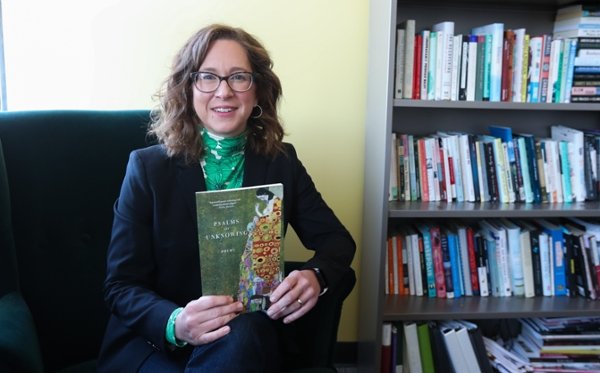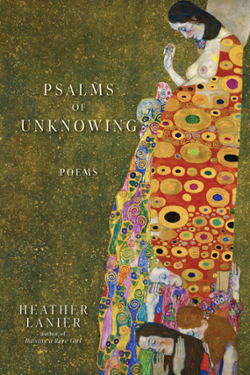Writing Arts professor explores modern American life through new volume of poems
Writing Arts professor explores modern American life through new volume of poems

In her first full volume of poetry, “Psalms of Unknowing,” Writing Arts Assistant Professor Heather Lanier presents a lean, honest, often funny and always direct take on modern American life.
The 81-page volume, released in September by Monkfish Book Publishing Company, follows Lanier’s celebrated 2020 memoir, “Raising a Rare Girl,” a New York Times Editor’s Choice pick.
From the opening page, titled simply “Pumping Milk,” Lanier pulls the reader in with concrete, concentrated language drawn from experience.
Topless at the office
like a scandal,
I stand otherwise constructed –
trousers, polished black shoes,
hair a neat crop, the reds
of my face muted by beige smear.
My affair here is with
a machine.
Lanier, who is also creative writing coordinator in the Department of Writing Arts in the Ric Edelman College of Communication & Writing Arts, explores issues and emotions ranging from a love poem to her daughter to piercing political observation.
“Most of the poems are written from a place of spiritual longing, of wanting to live in a world of beauty and wholeness,” Lanier said. “But also, from a place of uncertainty, and being comfortable in the uncertainty.”
About twice as long as her first two poetry collections, “Psalms of Unknowing” at times carries the reader on a tightrope that many Americans feel they walk every day, especially when conversations may turn political. It’s a tightrope often fraught with contradictions, as well as with the possibility of confrontation, as Lanier writes in “Loving Thy Right-Wing Neighbor.”
You were the first to knock
on our door, offer your number.
Next month your church will erect
foam tombstones for fetuses,
a Halloween trick turned sad.
Mine’s got a sign that says people
who never step foot in yours
matter.
In “My Family and I Disagree about Politics,” the title suggests a theme that can be hot with emotion but its message is subtle, linking political discord with the trauma, then healing, that many human bodies go through.
“I wrote that because it’s true for nearly all of us,” Lanier said. “We’re kin with people who we fundamentally disagree with. The country is being ripped in half in a way that, pre-cable news, didn’t exist. We have to figure out a way to live with and love each other.”
Expressing oneself through poetry, Lanier said, provides opportunities to experiment with both words and form, and she revels in it.
“Sometimes things are just hard, and you want to write straight about them,” she said. “But a lot of times there’s humor in the hardest situations and I do want to have fun.”